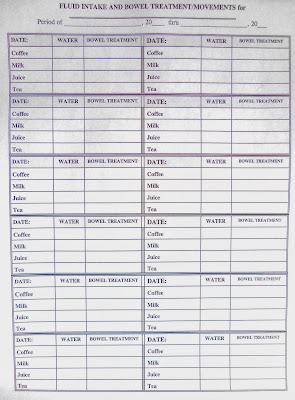Caregiving 101: Respect and Honor - Prelude
In these times, it can be hard to give the proper respect and honor that is needed. But it is still necessary to do so.
The Bible says that we are to honor our father and mother. The Lord did not say to honor them if they are honorable, but to honor them. Sometimes it is honoring the position they hold, not the behavior they exhibit.
Today a friend shared the above photo with me and it moved me deeply. It also reminded me of the following story that I had saved several years ago. The story is reported as being true. But even if it isn't, it is great material for thought. I share it here as a prelude to our sharing on respect and honor.
Caregiver, please remember that we, too, may be the care-receiver one day. Stay on your knees, and keep looking up.
~~~~~~~~~~~~
When an old man died in the geriatric ward of a nursing home in an Australian country town, it was believed that he had nothing left of any value.Later, when the nurses were going through his meager possessions, They found this poem. Its quality and content so impressed the staff that copies were made and distributed to every nurse in the hospital. One nurse took her copy to Melbourne. The old man's sole bequest to posterity has since appeared in the Christmas editions of magazines around the country and appearing in mags for Mental Health. A slide presentation has also been made based on his simple, but eloquent, poem. And this old man, with nothing left to give to the world, is now the author of this 'anonymous' poem winging across the Internet.
Cranky Old Man
What do you see nurses? . . .. . .What do you see?
What are you thinking .. . when you're looking at me?
A cranky old man, . . . . . .not very wise,
Uncertain of habit .. . . . . . . .. with faraway eyes?
Who dribbles his food .. . ... . . and makes no reply.
When you say in a loud voice . .'I do wish you'd try!'
Who seems not to notice . . .the things that you do.
And forever is losing . . . . . .. . . A sock or shoe?
Who, resisting or not . . . ... lets you do as you will,
With bathing and feeding . . . .The long day to fill?
Is that what you're thinking?. .Is that what you see?
Then open your eyes, nurse .you're not looking at me.
I'll tell you who I am . . . . .. As I sit here so still,
As I do at your bidding, .. . . . as I eat at your will
.I'm a small child of Ten . .with a father and mother,
Brothers and sisters .. . . .. . who love one another
A young boy of Sixteen . . . .. with wings on his feet
Dreaming that soon now . . .. . . a lover he'll meet.
A groom soon at Twenty . . . ..my heart gives a leap.
Remembering, the vows .. .. .that I promised to keep.
At Twenty-Five, now . . . . .I have young of my own.
Who need me to guide . . . And a secure happy home.
A man of Thirty . .. . . . . My young now grown fast,
Bound to each other . . .. With ties that should last.
At Forty, my young sons .. .have grown and are gone,
But my woman is beside me . . to see I don't mourn.
At Fifty, once more, .. ...Babies play 'round my knee,
Again, we know children . . . . My loved one and me.
Dark days are upon me . . . . My wife is now dead.
I look at the future ... . . . . I shudder with dread.
For my young are all rearing .. . . young of their own.
And I think of the years . . . And the love that I've known.
I'm now an old man . . . . . . .. and nature is cruel.
It's jest to make old age . . . . . . . look like a fool.
The body, it crumbles .. .. . grace and vigour, depart.
There is now a stone . . . where I once had a heart.
But inside this old carcass . A young man still dwells,
And now and again . . . . . my battered heart swells
I remember the joys . . . . .. . I remember the pain.
And I'm loving and living . . . . . . . life over again.
I think of the years, all too few . . .. gone too fast.
And accept the stark fact . . . that nothing can last.
So open your eyes, people .. . . . .. . . open and see.
Not a cranky old man .Look closer . . . . see .. .. . .. .... . ME!!
Remember this poem when you next meet an older person who you might brush aside without looking at the young soul within. We will all, one day, be there, too! PLEASE SHARE THIS POEM (originally written by Dave Griffith) The best and most beautiful things of this world can't be seen or touched. They must be felt by the heart!



